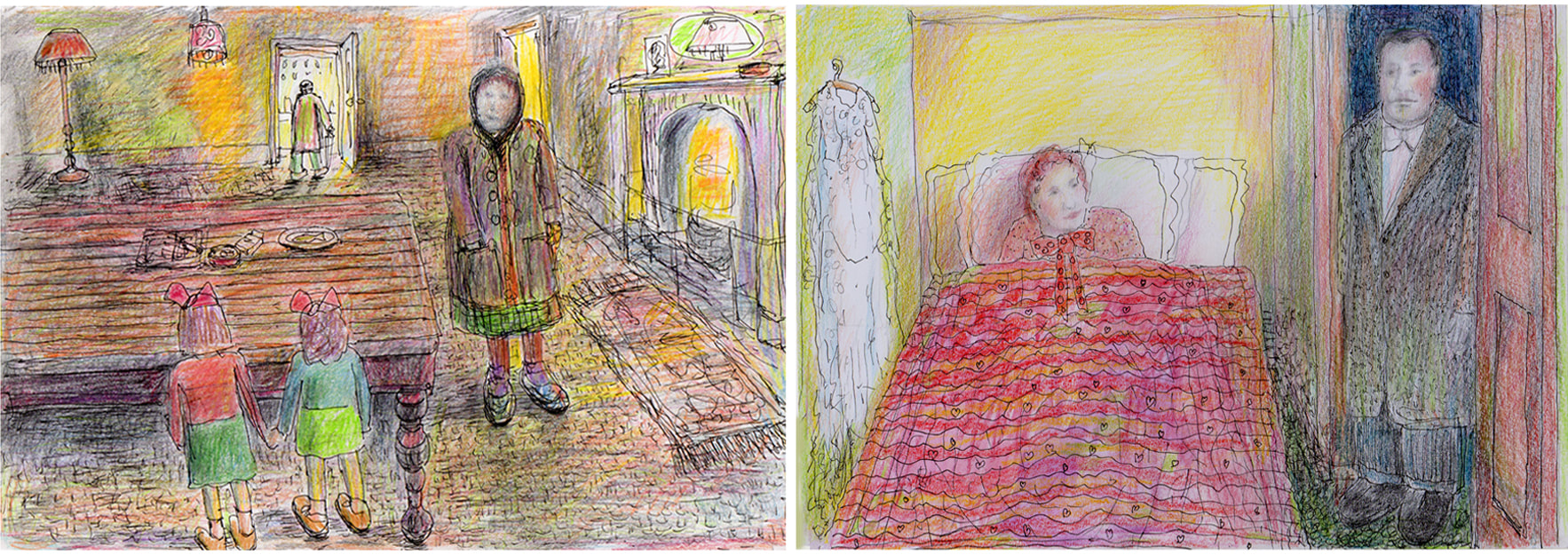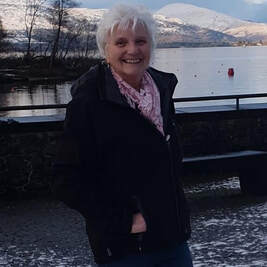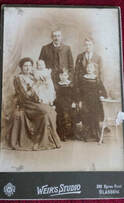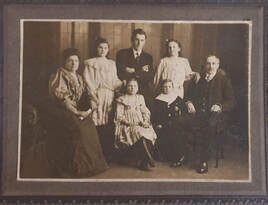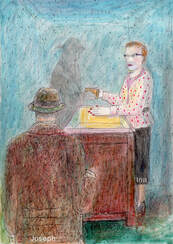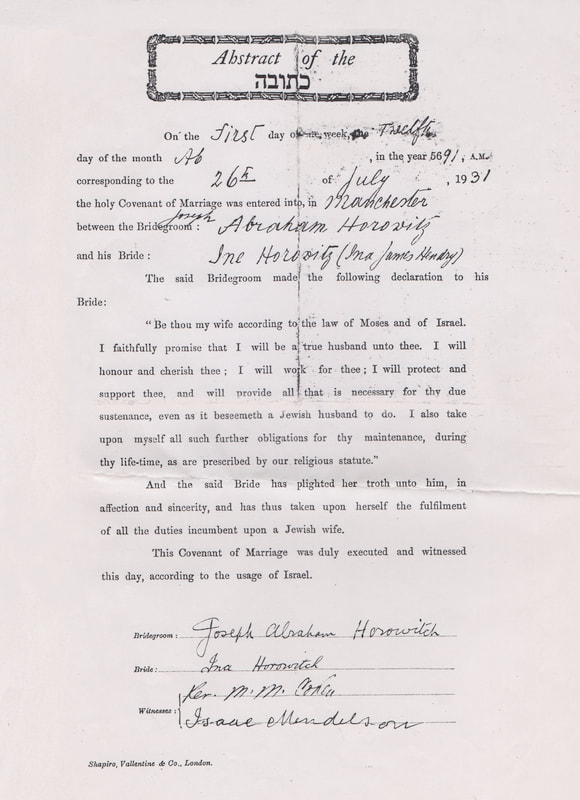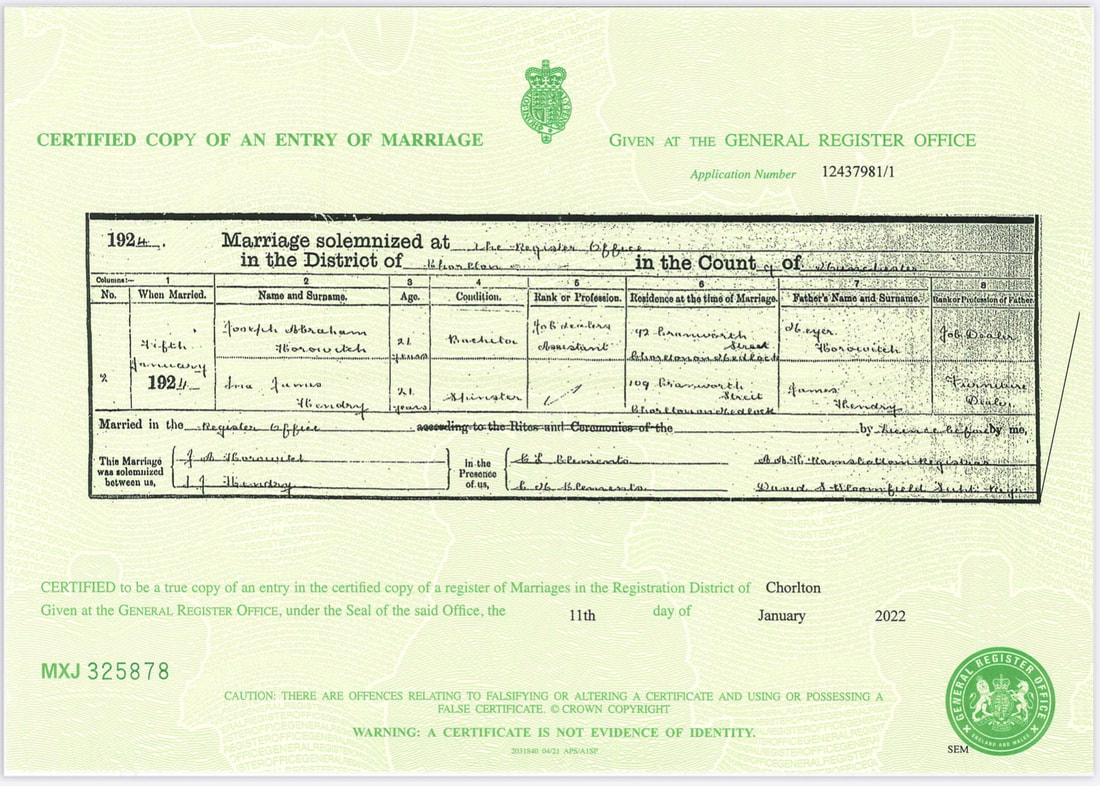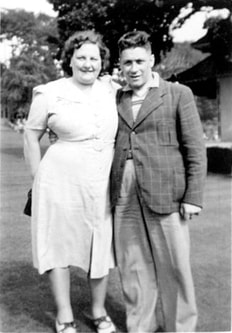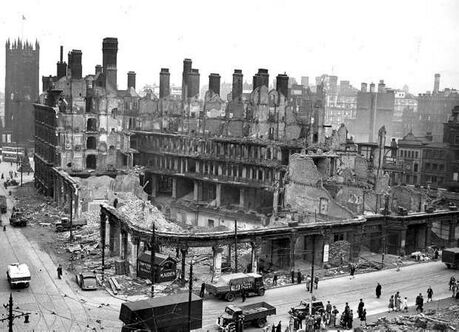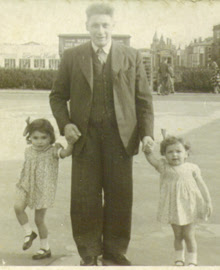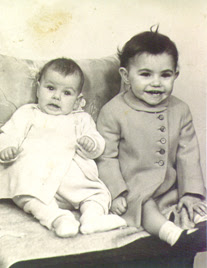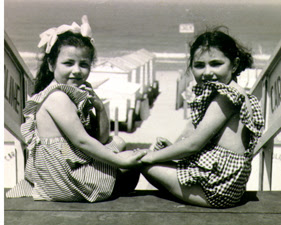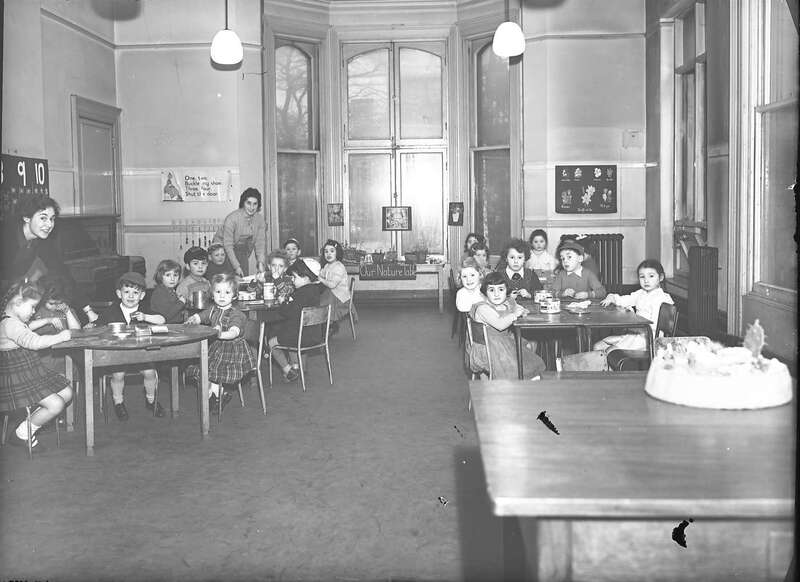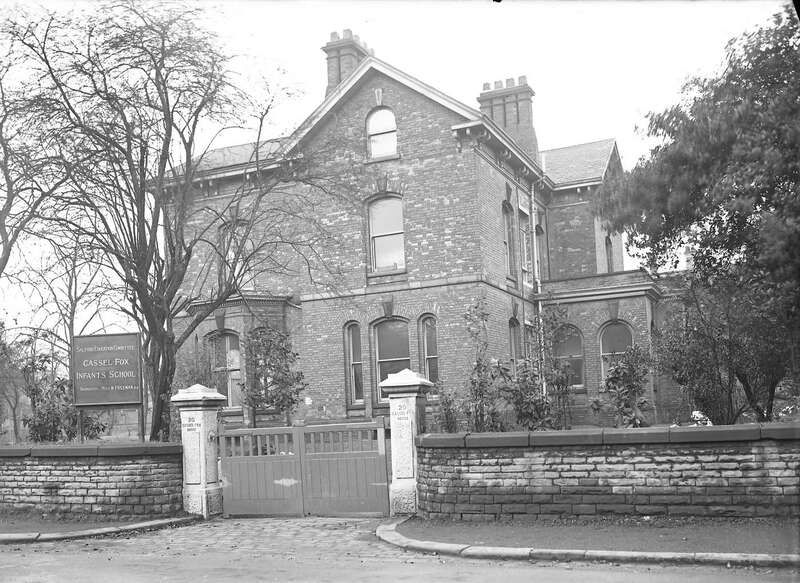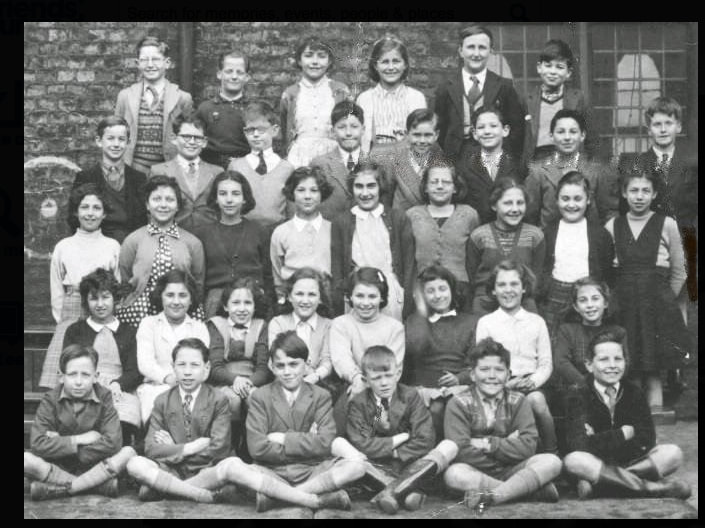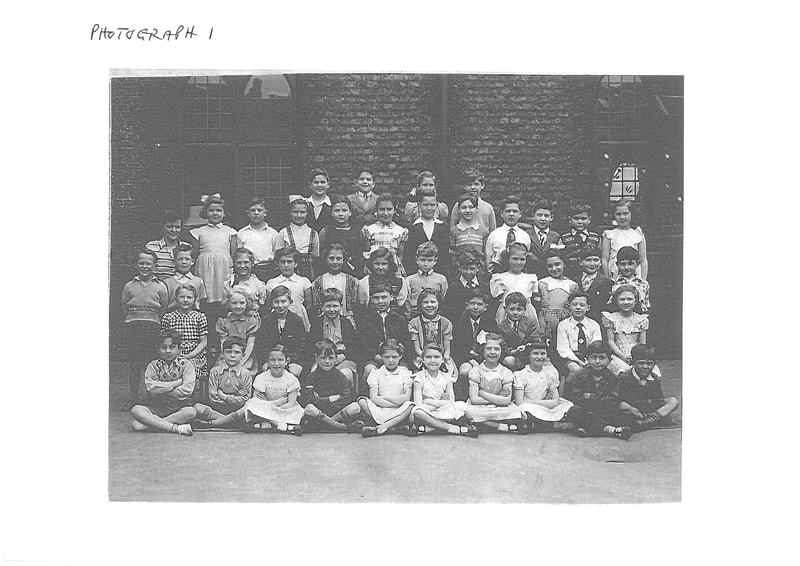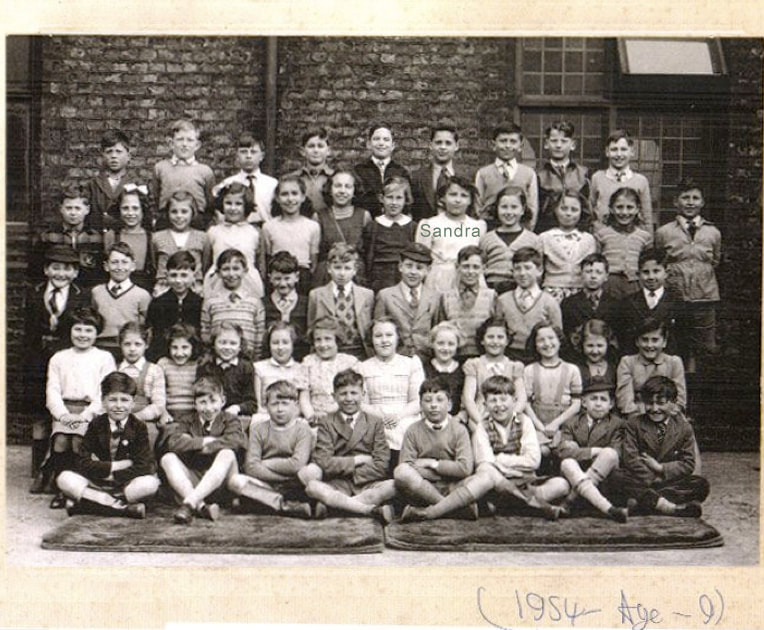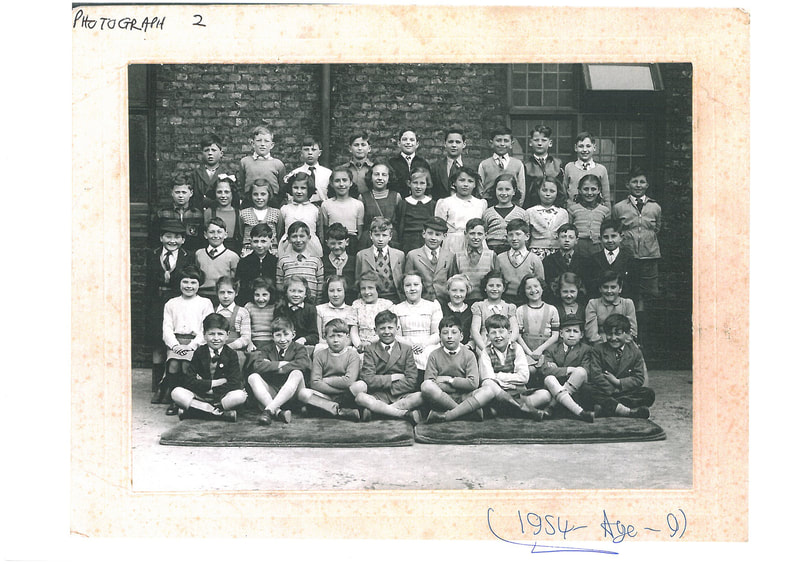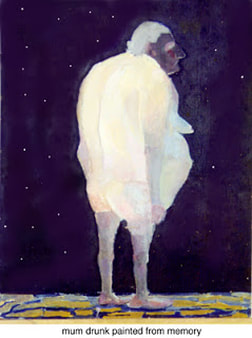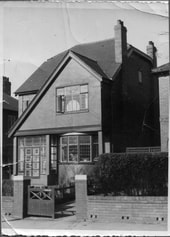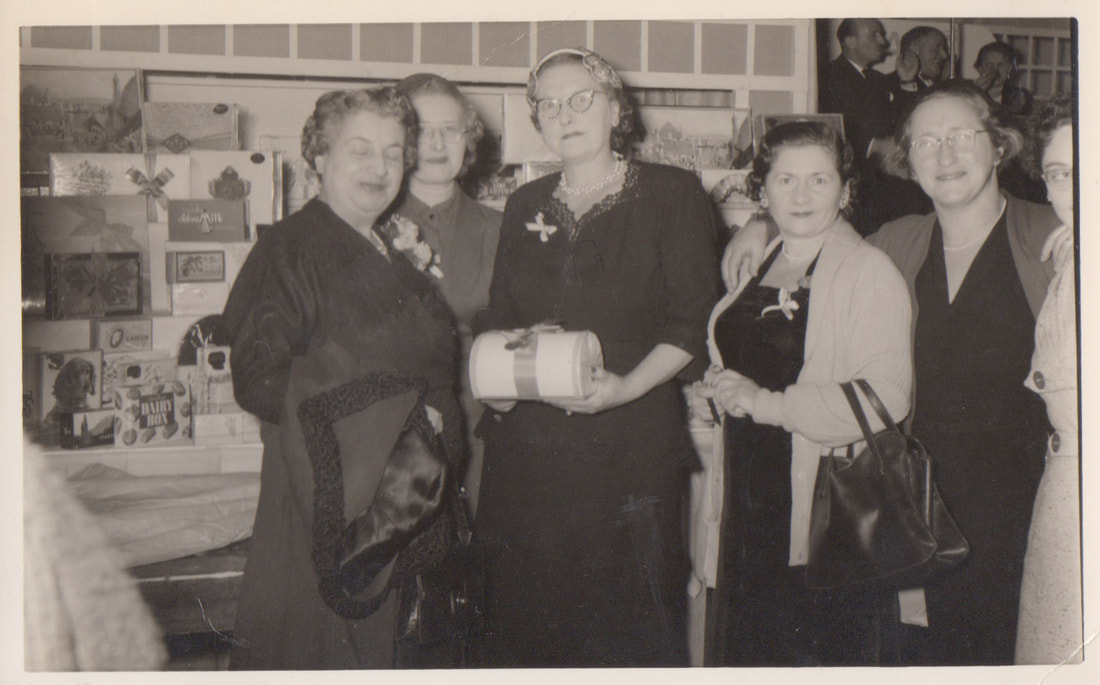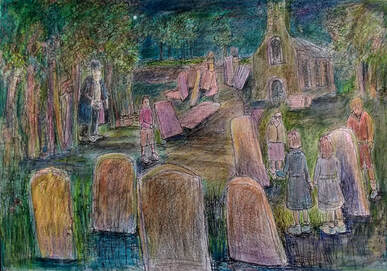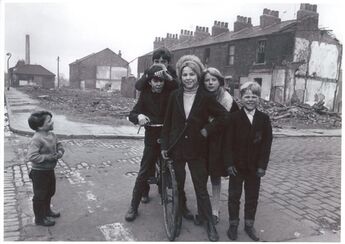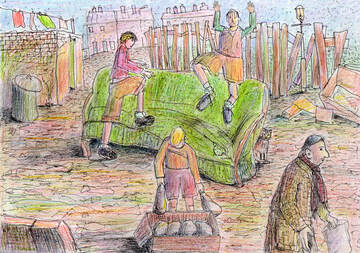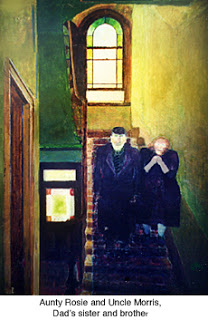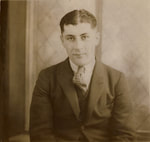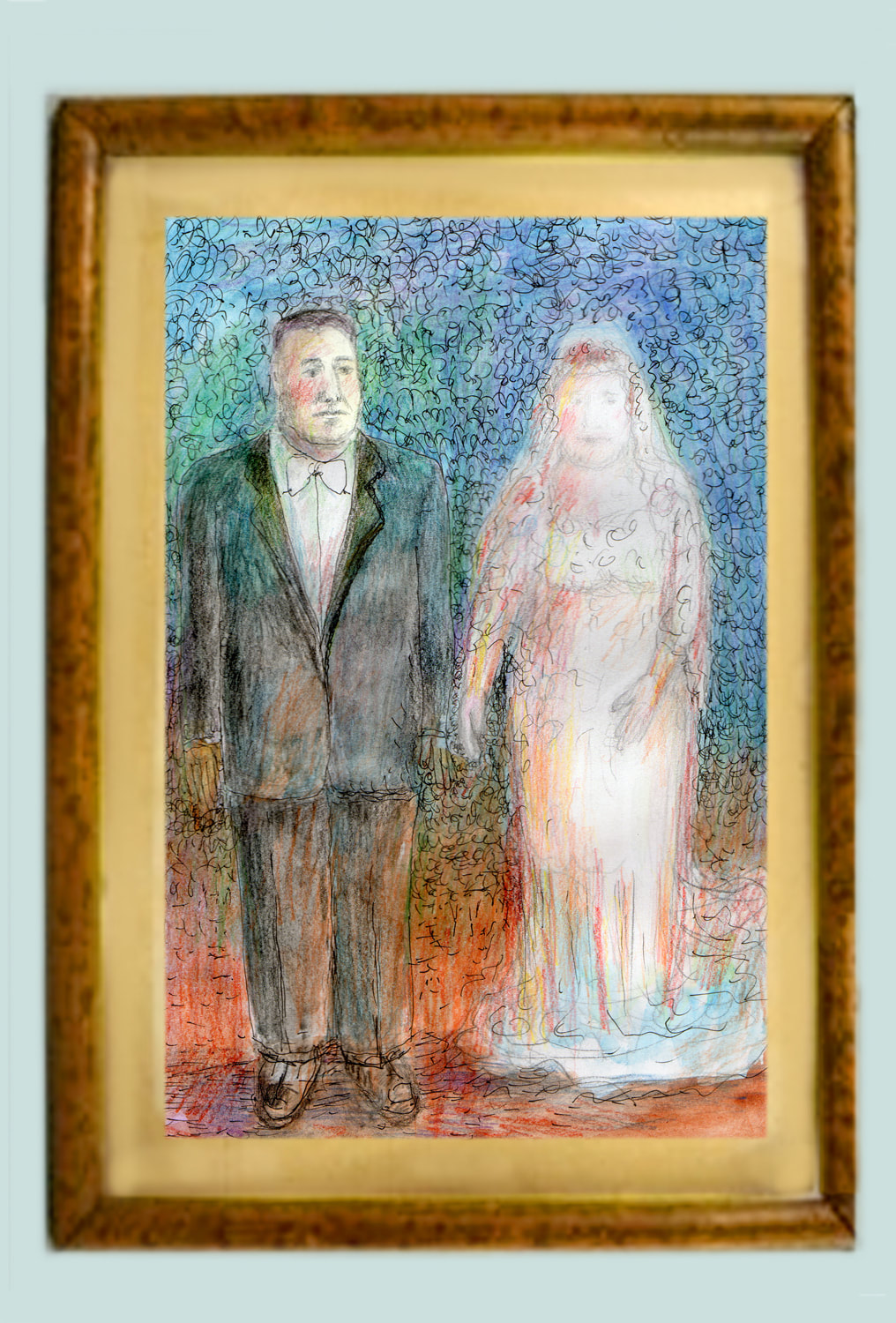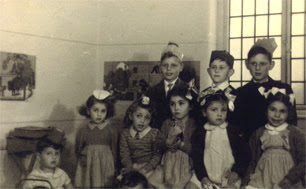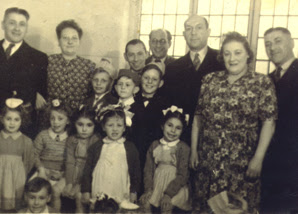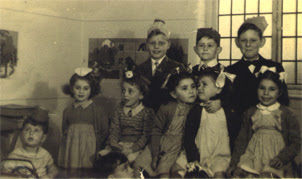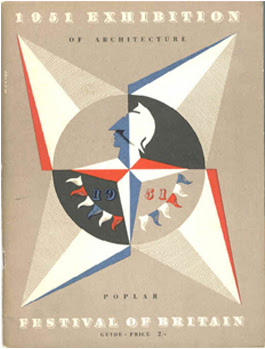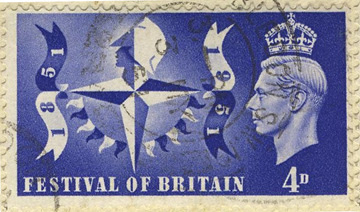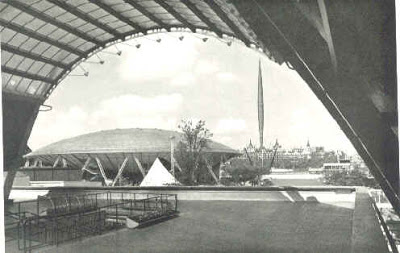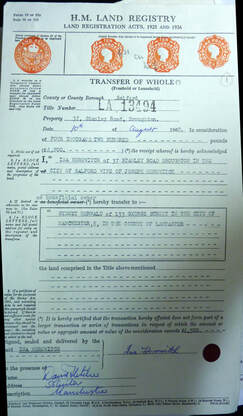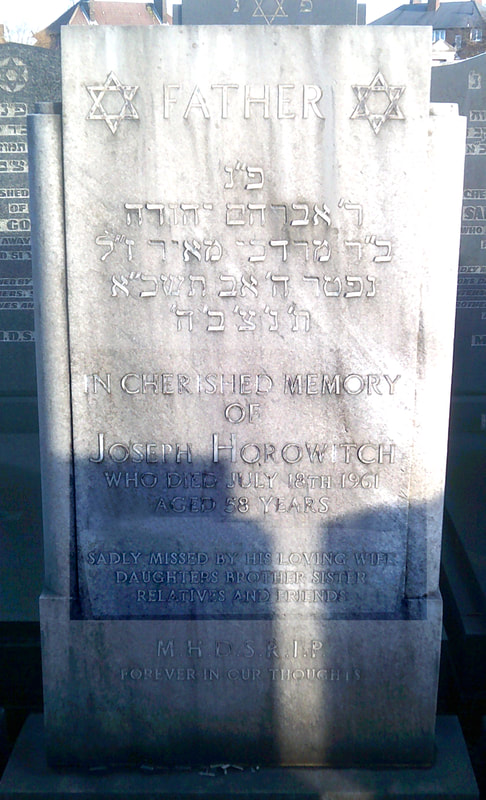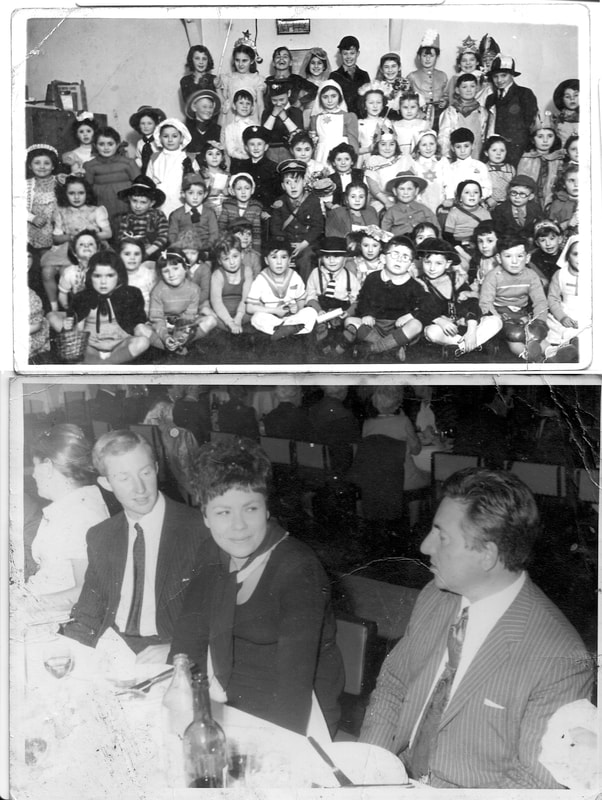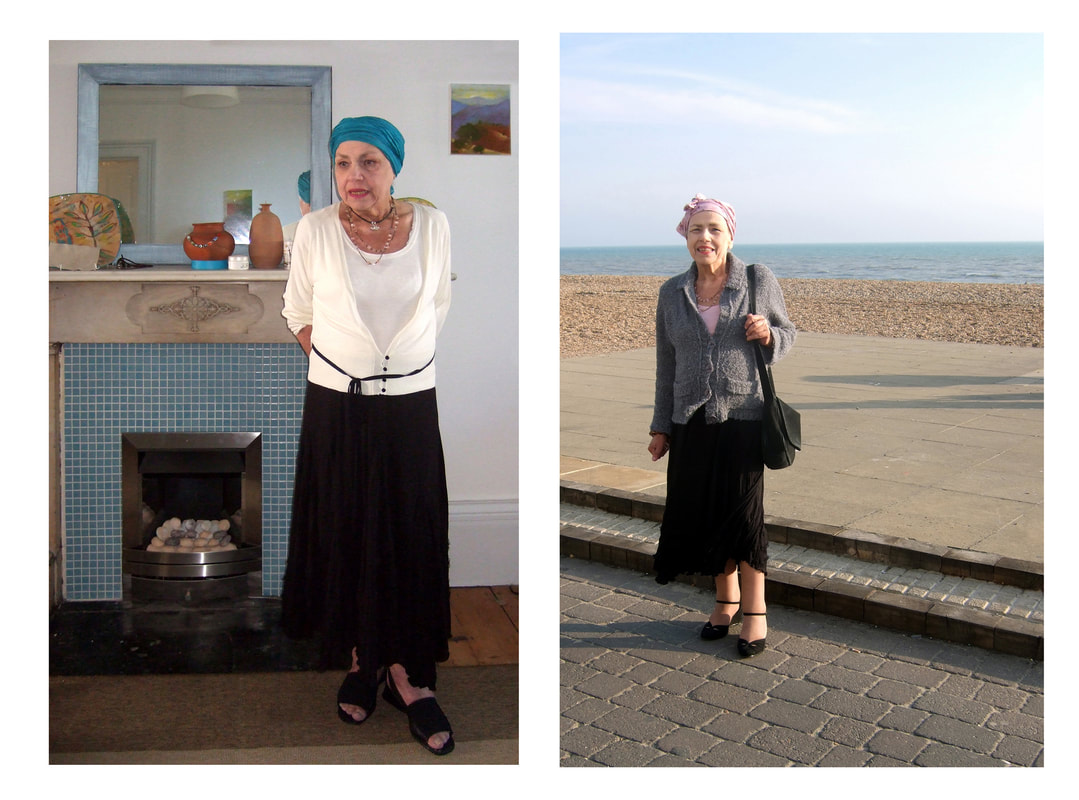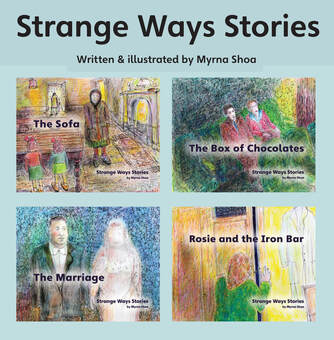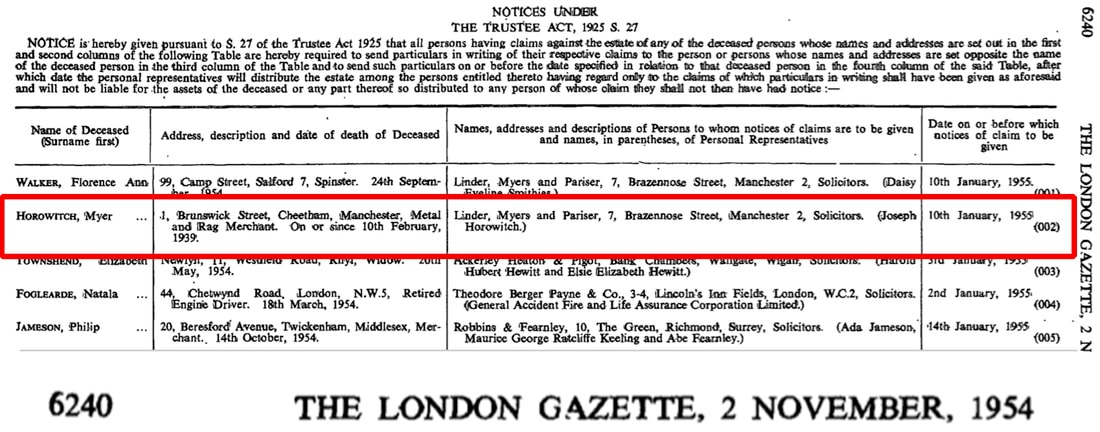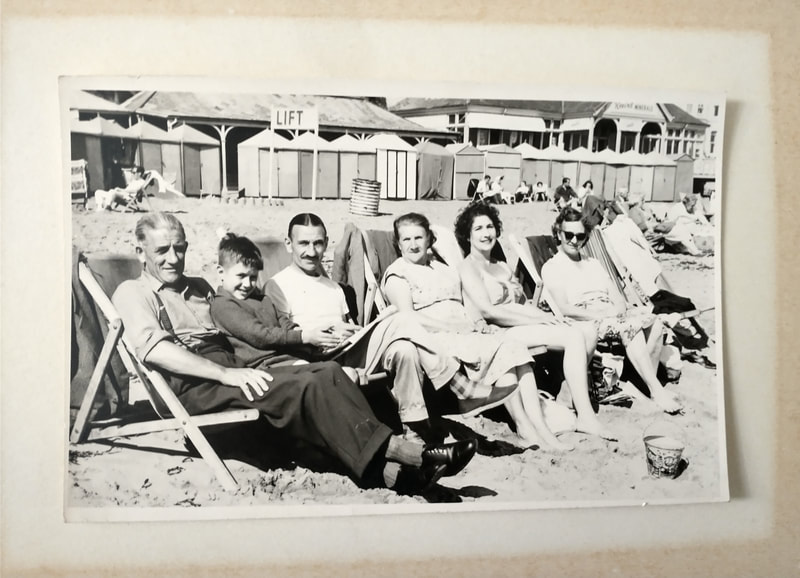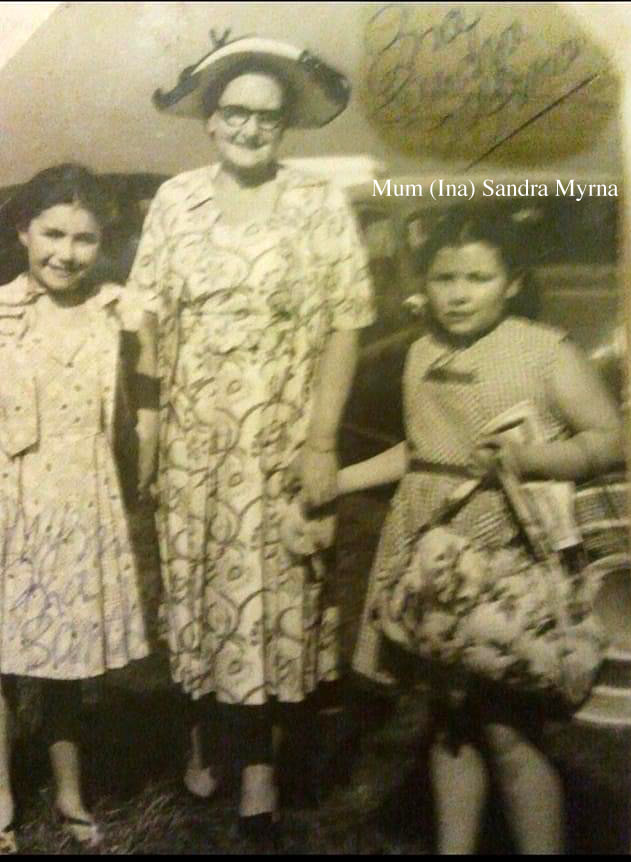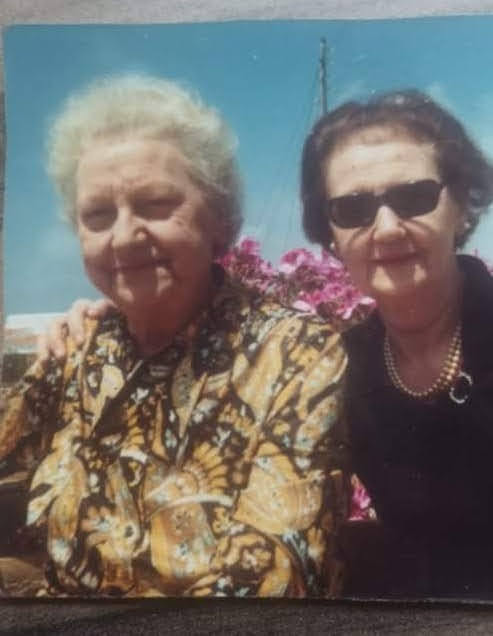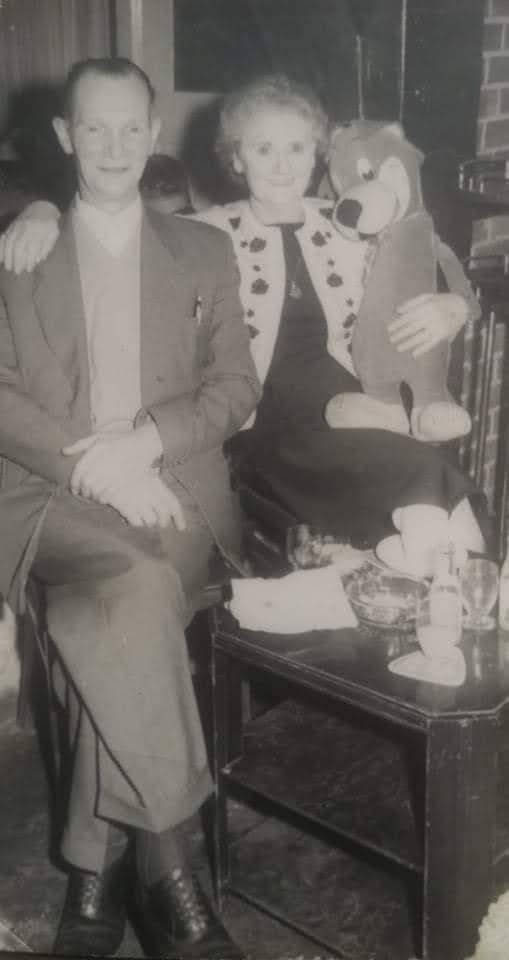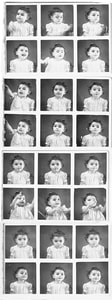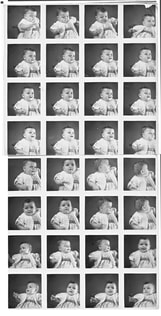Do you remember?
Sandra Barnard and her sister Myrna Shoa record their stories*of first generation immigrant's children born in Cheetham Hill Manchester, England. The World through the eyes of children, Saturday, 24 February 2007.
"In the last year of my sister Sandra's life we passionately gathered together our stories from our childhood for this website. We disagreed sometimes about what happened realising that we saw the world through our own eyes. This enlivened the recollections, made them richer. These stories are mainly for our families to read, to answer questions about their backgrounds, history and connection to the other cultures they have come from. With Sandra's passing I am the last of the Horowitchs. No one else is alive. Without this wonderful story gathering I would not have been able to write, illustrate and have published Strange Ways Stories about our shared upbringing. As children the only relatives we had were Joseph our father and Ina our mother and our Uncle Morris and Aunty Rosie, unmarried broiother and sister, The relatives on our mother Ina's side, the Hendry's as far as knew were dead*. Sandra and I met Aunty Betty, our mother's sister several times in London and Uncle James our mother's brother a few times, in Scotland when we were about 10 or 11 years of age.
Sandra lives on in these stories. (16/10/1944 - 18/11/2007). These stories may resonate with yours," Myrna Shoa 2020
Sandra lives on in these stories. (16/10/1944 - 18/11/2007). These stories may resonate with yours," Myrna Shoa 2020
"Since Sandra's death in November 2007 I have been trying to find out any more information about our backgrounds. In May 2021, I discovered the actual newspaper articles about our grandfather Meyer, Rosie and Morris, recently digitised, uploaded and available free from the British Newspaper Archive. Sandra would have been amazed and delighted to see all this and I hope she is looking down and smiling. SEE STRANGE WAYS STORIES our version of these stories told to us over and over again.
Past, Present & Future
|
*In the time of Covid - 19 Pandemic in 2021 the daughter of Margaret Bushnell Hendry emailed me having seen this website. She is a first cousin. I had last seen Margaret when I was about 11 years old and she about 9. Margaret's father was James Hendry our mother's brother. Her mother Nellie Hendry fell out with our mother and they never spoke again. Margaret and I had some shared stories in common, many of which are on this website. Her family doubted that some of her Horowitch stories she told them were true. Now, they know that the events actually happened.
In December 2021 Richard Casson a passionate researcher of family history and stories about Cheetham Hill and Thomas Street School got in touch having found this website whilst searching for Thomas Street School. He went to the same primary school and played with Sandra and I in the 1950s. He knew about my family and is still in touch with most of the other people from that time, who played with us. I can now fill in the gaps and add to the stories about 'Myrna and Sandra.' Past, Present and Future are entwined in these moments.
|
HOW OUR PARENTS MET
|
Our mother, Ina Hendry, was born in Clydebank, Scotland in 1904, the second youngest of five children. She was the daughter of James and Margaret Hendry (nee Stuart). Her mother died when Ina was young in her early teens. Her sisters and brothers in order of birth were, Jean Hendry, the oldest, who arrived at the very end of the 19th century, then Robert Hendry, the second born. He emigrated to the United States as a young man, tried to make a career in show business as a singer and then began working in the automotive industry. He settled in Chicago where he married Jeanie.
|
|
Betty Hendry was the third child. She moved to England and married Bert Fay a chef in a London hotel. They adopted Bert’s natural daughter, Cathy. They had no children of their own. The youngest was James Hendry. He married Nellie, considered by our mother, to be socially beneath him. Nellie was a Catholic. They had a large family and lived on a council estate near Loch Lomond. James worked as a lithographer and colour printer. (Some of his sons were master butchers) He died young of lung cancer in the late 1950s.
Ina Hendry moved to Manchester when she was nearly 18 and managed a sweet shop. It was here she met our father Joseph who fell for her in a big way. He was the second of three surviving children of Myer and Bella, Jewish Latvian refugees, escaping anti-Semitism and poverty at the turn of the century. |
The Horowitchs had intended to emigrate to the United States, but somehow, they ended up in Manchester. At the time we weren't sure if the family name in Latvia was Einger or Unger. However, on the web we have found a reference to Judel Einger, otherwise known as Joseph Horowitch and our house address in Salford 7 at the time. So, now we know the name is Einger. They acquired the surname Horowitch through a misunderstanding with an immigration officer in Liverpool who didn't understand Yiddish. This passed down story makes no sense now, as more information has emerged.
NEW STORIES 2024
|
In 2024 I discovered more. Horowitch, is in fact our family name, so I am perplexed that Einger came up for our father? The immigration man story was told and retold to us throughout our childhood. From my DNA results on Ancestry I have made contact with first and second cousins whose family were all from Dvinsk who are related to Sandra and I through the sister of our Grandfather Myer. Now I know that there is a Cohen in the family who are part of a huge family. Now Sandra and I have relatives all originating from Dvinsk.
|
Grandfather Myer started his own Rag business, buying waste wool, cotton and later on scrap metal, sorting it and selling it to manufactures, where it was recycled and made into new products. Joseph left school at 14 and went to work for his father. Joseph had contracted Rheumatic fever when a small child. This damaged his heart, which caused his premature death when he was in his fifties, 58 years old.
Myer treated our Dad badly he obviously didn’t love him as he wished our Dad had died instead of his beloved youngest son Simon. He asked god why he hadn’t taken Joseph instead of Simon. After Dad left school at the age of fourteen he was employed by his father but paid poorly. Even after he was married he was still on a low wage and he would often walk home from work to save his bus fare so that he could take Mum to the cinema. Myer would put a piece of coal on the fire, decide it was warm enough without it and take it off again rather than let it burn away.
Myer treated our Dad badly he obviously didn’t love him as he wished our Dad had died instead of his beloved youngest son Simon. He asked god why he hadn’t taken Joseph instead of Simon. After Dad left school at the age of fourteen he was employed by his father but paid poorly. Even after he was married he was still on a low wage and he would often walk home from work to save his bus fare so that he could take Mum to the cinema. Myer would put a piece of coal on the fire, decide it was warm enough without it and take it off again rather than let it burn away.
Myer Horowitch never fully trusted in banks and liked to have cash hidden around his house in tins, cupboards and under mattresses. He had come from Dvinsk in Latvia to England as a penniless refugee (emigré) and hadn’t adapted to the new country. He was illiterate in his own language Yiddish as well as English, so he had to sign his cheques with a cross. Myer a religious Jewish man wore a yamulka and prayed, (yet our mum told Myrna that his fly was often left undone).
(May 2021 see the Manchester newspaper articles about this story which has other piece of information which Sandra and I didn't know).
In 1939 on a Sabbath evening during the 2nd World War he just walked out of the house in Brunswick Street. As it was Sabbath he wasn’t carrying any money in his pockets and was never seen again. He was 70 years old. Mum and Dad checked with the police, hospitals and the morgue to no avail. The most likely explanation was that he was killed during an air raid and maybe blown to bits.
Of course he never made a will and for over twenty years the family solicitor was trying to sort out Myer’s estate. ‘Next year god willing Joseph, it will be sorted. He was declared dead in 1954.’
(May 2021 see the Manchester newspaper articles about this story which has other piece of information which Sandra and I didn't know).
In 1939 on a Sabbath evening during the 2nd World War he just walked out of the house in Brunswick Street. As it was Sabbath he wasn’t carrying any money in his pockets and was never seen again. He was 70 years old. Mum and Dad checked with the police, hospitals and the morgue to no avail. The most likely explanation was that he was killed during an air raid and maybe blown to bits.
Of course he never made a will and for over twenty years the family solicitor was trying to sort out Myer’s estate. ‘Next year god willing Joseph, it will be sorted. He was declared dead in 1954.’
Ina and Joseph married in 1924. Ina was not welcomed by Joseph’s family. Mixed marriages were considered by both the Jewish and Christian communities as something to be avoided. However, over a period of time, relations improved and Ina converted to Orthodox Judaism which required a lot of study. She married Joseph in the Synagogue on July 26 1931. She became a Jewish woman, learnt the rituals and festivals. They must have loved each other for they stayed together until Joseph died in 1961,
Discovering this Ketubah is an important document in Sandra's and my stories. We ached to belong to the Jewish community in which we lived. Both of us identified as Jewish. We were taunted that 'Your mother isn't Jewish". However when we were born in the 1940s our mother had become a Jewish woman. She had a Ketubah, a Jewish marriage contract, therefore confirming that we were Jewish).
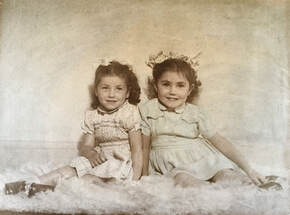 Sandra and Myrna
Sandra and Myrna
They wanted children, but it seemed it was not to be. They considered adoption and then after being married for 20 years the miracle happened. Ina was pregnant. Myrna was born in September 2nd 1943 and 13 months later a second daughter Sandra was born on October 16th 1944. Ina named Myrna after Myrna Loy the American film star who was famous for her long beautiful legs. Ina had become very fat, 16 stone in weight and she didn't even realise that she was pregnant, putting the pains down to heartburn! Maybe Joseph had impotency problems and that is why she never conceived earlier, or maybe he just didn't fancy her as her shape had enlarged considerably over the years.
Myrna's memories
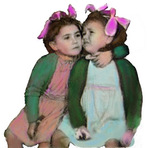
"Christmas time Mum had Sandra and me peering up the chimney of the coal fire in the breakfast room. Why? We had to ask Father Christmas to get us what we wanted.
Of course we believed in Father Christmas; leaving a pillowcase out on Christmas Eve for him to fill. Then we discovered the truth. Dad was Father Christmas and not a man with a red hat and coat on with a beard, but Dad, swarthy and handsome even though he was old," Sandra and Myrna
Of course we believed in Father Christmas; leaving a pillowcase out on Christmas Eve for him to fill. Then we discovered the truth. Dad was Father Christmas and not a man with a red hat and coat on with a beard, but Dad, swarthy and handsome even though he was old," Sandra and Myrna
Do you remember?
I can remember when sweets were rationed, rice was only used for making rice pudding, olive oil was bought at Boots the Chemist in little bottles for removing ear wax, spices were limited to cinnamon, nutmeg, pepper and cloves, all vegetables were boiled to death, crisps only came in one flavour, garlic was the work of the devil and everything seemed so bland.
Sandra's memories
Being brought up in a Jewish household meant that some of the food we ate was more interesting than the usual British diet. Chicken then was a luxury food yet we ate on a regular basis, either made into wonderful chicken soup with mandels or alkies or roasted for Sunday lunch. Mum made the best chopped and fried fish. She always swore that a mix of hake and haddock gave the best and sweetest flavour. This would be chopped with onion, loads of eggs, matzo meal and seasoning then formed into generous patties and fried in oil until deep golden brown. I enjoyed them either hot or cold, served with the beetroot and horseradish relish called chrane. Myrna didn’t like that sauce!
I still hanker after the black bread of my childhood. It doesn’t seem to exist anymore, or at least I can’t find it. This was a crusty sourdough bread made with rye flour and caraway. It was wonderful, as were, and still are, proper Jewish bagels, hard and chewy, nothing like the soft US version sold in most supermarkets today.
We would enjoy salt beef, pickled brisket, worsit and the deep red savaloys served with potato latkes and sweet and sour cucumbers. This was the kosher food of the Ashkenazi Jews of Eastern Europe, hearty, full flavoured and very different from the cuisine of the Sephardi community. We would go to Lapidus's, a local Jewish delicatessan and take away, have a salt beef sandwich at the same time as eyeing up the young men also buying food there.
We would enjoy salt beef, pickled brisket, worsit and the deep red savaloys served with potato latkes and sweet and sour cucumbers. This was the kosher food of the Ashkenazi Jews of Eastern Europe, hearty, full flavoured and very different from the cuisine of the Sephardi community. We would go to Lapidus's, a local Jewish delicatessan and take away, have a salt beef sandwich at the same time as eyeing up the young men also buying food there.
Sandra and Myrna's childhood photos - see more
Dad with Myrna and Sandra - Sandra and Myrna - Sandra and Myrna at the seaside - Blackpool or St. Annes
Starting school
OUR FIRST DAYS AT SCHOOL
When we were about two years old and three years old respectively our mother found it far too hard coping with her small daughters and arranged for us to attend a private Jewish school, Cassel – Fox, about quarter of a mile from our home.
On their first day there Sandra can remember crying when mummy walked away from them, but she was lucky having her big sister taking care of her. Myrna had to be strong and brave for her little sister.
We would go to school first thing in the morning, have lunch there, then be collected by our mum in the afternoon and walk home. The teachers were very strict about not wasting food and would be angry with any child who left food on his plate. We learned tricks such as wrapping the food we didn’t like in our handkerchief and hiding it in our pocket. Sandra remembers that she really liked the lochen pudding and never had a problem in eating it all up.
When a child had been tearful, he or she would be sent out of the classroom and not allowed back until the crying had stopped. Sandra can remember being filled with righteous indignation when on one occasion the teacher came out of the classroom to see if she had stopped crying, which she had, but wouldn’t let her come back because her breathing wasn’t yet under control after expending all that emotion.
When we were about two years old and three years old respectively our mother found it far too hard coping with her small daughters and arranged for us to attend a private Jewish school, Cassel – Fox, about quarter of a mile from our home.
On their first day there Sandra can remember crying when mummy walked away from them, but she was lucky having her big sister taking care of her. Myrna had to be strong and brave for her little sister.
We would go to school first thing in the morning, have lunch there, then be collected by our mum in the afternoon and walk home. The teachers were very strict about not wasting food and would be angry with any child who left food on his plate. We learned tricks such as wrapping the food we didn’t like in our handkerchief and hiding it in our pocket. Sandra remembers that she really liked the lochen pudding and never had a problem in eating it all up.
When a child had been tearful, he or she would be sent out of the classroom and not allowed back until the crying had stopped. Sandra can remember being filled with righteous indignation when on one occasion the teacher came out of the classroom to see if she had stopped crying, which she had, but wouldn’t let her come back because her breathing wasn’t yet under control after expending all that emotion.
The children were not allowed to use their fingers as an aid to counting. Sandra got round this prohibition by leaning on her elbow and counting with her fingers on the side of her head. When challenged by her teacher as to what she was doing she replied that she was thinking.
Myrna remembers hating the food. It was after the second world war and food was still rationed, choice was limited and you had to take what was available. But, as a child Myrna didn't know, care or understand the situation: she just hated the food.
Joseph Tishler a fellow pupil aged five or less kissed Myrna up and down her arms and in his strong passion pursued her relentlessly....to no avail.
It was at Cassell Fox that we started to learn the Jewish rituals, stories and Hebrew with no understanding of what the words meant. Yet Myrna and Sandra felt guilty if they failed to say their prayers in Hebrew at night before going to sleep. Deeply disturbing questions Sandra and Myrna and friends asked each other were..Who do you love more, God or your mummy or daddy?'
Myrna remembers hating the food. It was after the second world war and food was still rationed, choice was limited and you had to take what was available. But, as a child Myrna didn't know, care or understand the situation: she just hated the food.
Joseph Tishler a fellow pupil aged five or less kissed Myrna up and down her arms and in his strong passion pursued her relentlessly....to no avail.
It was at Cassell Fox that we started to learn the Jewish rituals, stories and Hebrew with no understanding of what the words meant. Yet Myrna and Sandra felt guilty if they failed to say their prayers in Hebrew at night before going to sleep. Deeply disturbing questions Sandra and Myrna and friends asked each other were..Who do you love more, God or your mummy or daddy?'
CHEETHAM HILL METHODIST SCHOOL - THOMAS STREET
Sandra and Myrna then went to Cheetham Hill Methodist School, know as Thomas Street. Some years they were both in the same class as Myrna's birthday September 2nd meant that she was either the youngest in a class or one of the oldest. New term dates were from September 1st. It was in a very poor area and some children looked as though they weren't taken care of by their parents. Maybe a third to a half of the pupils were from Jewish backgrounds and a Rabbi would come and give lessons on Jewish traditions and stories. Miss Rydiard had 50 children in her class and to keep order she had to make us put our hands on our head and keep them there for a long time. She would hit us with a ruler if we disobeyed. I can't remember whether she hit our hand or our knuckles.
Mum's problems
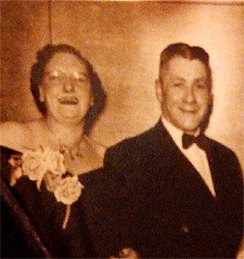
Mum and her ‘Problems.
Our mother enjoyed a drink and a smoke whilst watching TV. She would have a glass of whiskey and orange. When she and dad came back from their dinner dances she sometimes had a problem keeping her balance, drunk almost falling down when getting out the taxi. This didn’t become a major problem until in 1954 she had a really bad accident falling down a long flight of steep stone steps outside Joan Lakes house. She claimed she felt all right and drove herself home in her Ford Console.
Later in the day she felt very ill and called the doctor who diagnosed concussion and told her to rest. He missed the point that she and she was in fact bleeding into her brain and a blood clot was forming. This necessitated an emergency operation to remove the blood clot or she could have died. Roughly the same time her youngest brother James was diagnosed with terminal lung cancer. She was flying backwards and forewords to Scotland to see him. She felt she had to go and visit him. She seemed to take the news really hard, yet we didn’t know she cared that much as we had never met him or his family. He died within a year of the diagnosis.
She started drinking secretly and heavily and became a danger to herself and others. She was falling around all over the place. Her voice was often slurred. She made pointless and senseless demands and became extremely difficult to live with. She hid her alcohol, brandy anywhere in the house. Many times we came home from school she was drunk, her voice was slurred and the gas poker was on but not lit. She kept saying that she wanted to die. We used to call Dad when we felt we couldn’t cope. He would come home and help us manage her. 'Myrna, Myrna, Sandra, come here,' Mum would call us. We would find her naked, drunk, and horrible. She would place her hands on the shoulders of one of us, so that we could take her to the toilet and then back to her bed. Because she was drunk she would sway and could easily have toppled over. 'Myrna, Myrna Sandra,' she would call. Sometimes we would find her on the floor, drunk and unable to get herself up. We had to haul her up while she continued ranting to us about how bad we were or that we didn't care for her. We missed a lot of secondary schooling thorough having to be at home to keep an eye on her. We didn’t want anyone to know outside the house. It was difficult for girls, pre teens to cope with. Years after the death of our father when she moved to Menorca, Spain, she continued drinking.
"Mum's Problems - I wonder now, whether our mother simply couldn't cope with having two children when she was approaching middle age? She was old enough to be our grandmother. This possibility isn't a justification or even an explanation, but simply an added element," Myrna 2021
Our mother enjoyed a drink and a smoke whilst watching TV. She would have a glass of whiskey and orange. When she and dad came back from their dinner dances she sometimes had a problem keeping her balance, drunk almost falling down when getting out the taxi. This didn’t become a major problem until in 1954 she had a really bad accident falling down a long flight of steep stone steps outside Joan Lakes house. She claimed she felt all right and drove herself home in her Ford Console.
Later in the day she felt very ill and called the doctor who diagnosed concussion and told her to rest. He missed the point that she and she was in fact bleeding into her brain and a blood clot was forming. This necessitated an emergency operation to remove the blood clot or she could have died. Roughly the same time her youngest brother James was diagnosed with terminal lung cancer. She was flying backwards and forewords to Scotland to see him. She felt she had to go and visit him. She seemed to take the news really hard, yet we didn’t know she cared that much as we had never met him or his family. He died within a year of the diagnosis.
She started drinking secretly and heavily and became a danger to herself and others. She was falling around all over the place. Her voice was often slurred. She made pointless and senseless demands and became extremely difficult to live with. She hid her alcohol, brandy anywhere in the house. Many times we came home from school she was drunk, her voice was slurred and the gas poker was on but not lit. She kept saying that she wanted to die. We used to call Dad when we felt we couldn’t cope. He would come home and help us manage her. 'Myrna, Myrna, Sandra, come here,' Mum would call us. We would find her naked, drunk, and horrible. She would place her hands on the shoulders of one of us, so that we could take her to the toilet and then back to her bed. Because she was drunk she would sway and could easily have toppled over. 'Myrna, Myrna Sandra,' she would call. Sometimes we would find her on the floor, drunk and unable to get herself up. We had to haul her up while she continued ranting to us about how bad we were or that we didn't care for her. We missed a lot of secondary schooling thorough having to be at home to keep an eye on her. We didn’t want anyone to know outside the house. It was difficult for girls, pre teens to cope with. Years after the death of our father when she moved to Menorca, Spain, she continued drinking.
"Mum's Problems - I wonder now, whether our mother simply couldn't cope with having two children when she was approaching middle age? She was old enough to be our grandmother. This possibility isn't a justification or even an explanation, but simply an added element," Myrna 2021
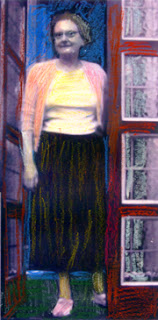
That fall and the subsequent drinking exaggerated who she was already, Myrna thinks. We couldn’t bring friends back to our house after school in case we found our mum drunk. The shame and embarrassment would have been too much to bear. We had to take on the responsibility of the cooking, cleaning and looking after the house. We were only eleven and twelve years old at the time. Also, she never liked our friends. She would verbally pull them to pieces and tried to stop the friendships in this way. Mum’s problems continued to dominate our lives through all our teens and into our twenties.
Her emotional manipulative manner continued to have a power over us for years. Even after she stopped drinking, she didn't stop being demanding and manipulative.
Her emotional manipulative manner continued to have a power over us for years. Even after she stopped drinking, she didn't stop being demanding and manipulative.
Secrets were part of our way of life
|
Even before she had a drink problem, she made us curl up in embarrassment. On social occasions she was seen by many as good fun, ‘the life and soul of the party’. She loved to be the centre of attention and would dance the highland fling. She was a huge woman and to us she looked ridiculous and we felt that people were, in fact, laughing at her and not with her. The more extrovert she became the more introvert we became. After all she was old enough to be our granny and maybe that was why we felt so self-conscious?
|
Secrets were a part of our way of life. Secrets that she hadn’t been born Jewish, (By the time we were born she had in fact got a Ketubah, a Jewish marriage contract, therefore confirming that we are Jewish).
Secrets that we all ate bacon (forbidden in Jewish law) behind closed curtains, as we were surrounded by Jewish families. Secrets about her drinking and suicidal tendencies. Dr Levy our family doctor gave her far too many prescribed drugs - barbiturates. Secrets that she became addicted to barbiturates for many years. No-one was there to support us two young girls. Dr Levy and Dad would say that we had to care for our Mum, our duty was to be there for her. It affected our schooling, our social life, our confidence: it put a huge strain on us. However we learnt to be ultra sensitive to drunkenness, emotional blackmail and manipulation. |
WE WERE PART OF THE COVER UP TO KEEP UP PRETENSES
We were part of a cover up about what really went on behind closed doors. In 2021 through reconnecting with people who were childhood friends I have at long last written about the secrets, pulled off the cover of respectability. (I am beginning to write up the stories)
|
However, we both have ended up creative, warm women. We didn't let what happened in our childhood turn us into 'victims'. It had an effect on the people we eventually became, but it didn't dictate our lives. We both realised that it is easy to stop yourself from doing things because you convince yourself that you have to sort out your childhood problems first. It is easy to remain stuck in the child role, but we are not those children anymore.
|
|
OUR MOTHER - Another point of view
How can you get a bigger picture your mother? To the outside world our mother was charming, the life and soul of the party. But to us children she was unpredictable, non tactile and emotionally blackmailing. As we were growing up we could see that our mother had a place in the Jewish community. She had established herself after many years and became the chairwoman of the Daughters of Zion, a charity organisation raising money for The Jerusalem Baby Home in Israel. |
(Sandra's viewpoint in 2007 was that our mother and other ladies innocently collecting money for that charity never realised that it was a foil to raise money for guns to help set up Israel during the 1950s onwards. We had had an experience in Israel which to Sandra confirmed her suspicions). Our mother organised Bring and Buy sale events to raise money; some were held in our house as well as bridge evenings where many people would come. Both our parents played bridge. Sandra and I were banned from coming downstairs when these evening events were on but we would peep from the stairs.
Our mother was an entrepreneurial woman. She left Scotland when her parents died and came to find work in Manchester on her own. Despite hostility from both Christians and Jews for having a mixed relationship, she fell in love with a Jewish man which was very much taboo in those days. Both sides would be angry that she married a bloody Jew or that he married a shiksa. But she and our father must have loved each other to put up with it. Remember, our parents were together for 20 years before we children came into the world, a lifetime together which we had no knowledge of.
Our mother was an entrepreneurial woman. She left Scotland when her parents died and came to find work in Manchester on her own. Despite hostility from both Christians and Jews for having a mixed relationship, she fell in love with a Jewish man which was very much taboo in those days. Both sides would be angry that she married a bloody Jew or that he married a shiksa. But she and our father must have loved each other to put up with it. Remember, our parents were together for 20 years before we children came into the world, a lifetime together which we had no knowledge of.
Scary Hasid in churchyard
|
Sandra and Myrna with Cheetham Hill Methodist, primary school friends from around Stanley Road used to go and play hide and seek in a graveyard next to a derelict (possibly war damaged church). We girls about 9 or 10 years old were always nervous in case the weird old man, a Hasid with a beard, black hat and clothes would appear out from the shadows and terrifyingly would try and touch us. He probably was a paedophile. We couldn't tell our parents. Our mother always warned us not to speak or go with strangers without any examples of what she meant. What could happen if we spoke or went with strangers?
|
Stories from our childhood
Two of these family stories made headline news in the Manchester Evening News. The violent attack on Rosie and the story of children finding money in an old smashed up sofa. Myrna wrote snd illustrated these recollected stories, which were published by Gatehouse Media
|
Our Uncle Morris had been in Strangeways prison. Sandra and I never found out exactly why. We think he was jailed for receiving stolen goods. He also had a boxing stadium, but we could't find any information about that. As far as we knew he had never married. Rosie lived with him in first of all in the family house in Brunswick Street, then in a house at 347 Cheetham hill Road
|
One night Rosie answered the door and a man asking for Morris as he was owed money, pushed his way into the house and smashed an iron bar on to Rosie's head. Covered in blood she climbed over a wall to the neighbours who upon seeing a bloodied woman slammed the door in Rosie's face. Somehow Rosie ended up in Crumpsall hospital. Morris returned home to find police looking around the shabby place. They thought Rosie had stolen goods as they had discovered many cardboard boxes filled with expensive clothes wrapped in tissue paper from Kendal Milne's an expensive shop in Manchester. Rosie had been going there, buying dresses in sizes too small for her to fit in to as she intended to lose weight to be able to wear them.
THE MARRIAGE OF AUNTY ROSIE
|
Myer's daughter Rosie, a pearl in his eyes wanted to get married and her parents had to make a suitable match. But a match was proving difficult to make. Myer did manage to arrange a suitable match for her, a shidduch. (Here you can see the marriage certificate). Rosie Horowitch, married Moishe Mendleson but on the wedding night Moishe left to buy some cigarettes and never returned. In 2022 I have been sent Rosie's divorce papers. She had no address for him except an address where she knew he would pick up mail. Moishe never turned up for the divorce proceedings. She gained a divorce on the grounds of his adultery.
Rosie died a virgin. Rosie had the habit of repeating the trivial bits of gossip that fascinated her but left others yawning. Every year Rosie would come with her brother Morris for the Jewish Passover feast to our house in Stanley Road and she would ask the same question every year about which Matzo we had this year.
|
Birthday parties with Punch and Judy
When we were living at our house in Stanley Road and aged about three and four years our mother decided that as our birthdays were only just a month apart she would arrange a joint birthday party for us and as a special treat would hire a Punch and Judy man to entertain us and our guests.
The great advantage of our house was that it had been built over three floors and the top floor, which was a huge room, was our wonderful playroom. It was the place where our imagination could run beyond any limitations. It was our space and it was in the playroom that the puppet theatre had been set up.
After the usual birthday tea of egg, tinned salmon, cheese and tomato sandwiches, chocolate biscuits, jelly, and birthday cake we all trooped upstairs for the live entertainment. At first everyone was having a great time until the crocodile made his first appearance. This was all too much for Sandra who immediately burst into tears. Luckily for her, Myrna was at hand to comfort and protect her.
The great advantage of our house was that it had been built over three floors and the top floor, which was a huge room, was our wonderful playroom. It was the place where our imagination could run beyond any limitations. It was our space and it was in the playroom that the puppet theatre had been set up.
After the usual birthday tea of egg, tinned salmon, cheese and tomato sandwiches, chocolate biscuits, jelly, and birthday cake we all trooped upstairs for the live entertainment. At first everyone was having a great time until the crocodile made his first appearance. This was all too much for Sandra who immediately burst into tears. Luckily for her, Myrna was at hand to comfort and protect her.
Sandra remembers her first stay in hospital
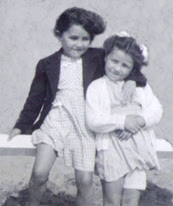
When I was about three years old I needed to have my tonsils and adenoids removed. It was arranged that I would go into hospital and have the operation and these are my memories and interpretations of what was happening to me.
I can recall the room where I stayed. It was a side-room, which I shared with one other patient. He was an adult male and I think I was told not to bother him, as he wasn’t very well. I can remember being really offended by being put in a cot with barred sides. At home, I slept in a proper bed. Only babies slept in cots.
As I was so young, it was decided by the doctors and my parents that they wouldn’t visit me in hospital as it was felt this would be more upsetting for me. I can remember that the young doctors and the nurses made quite a fuss of me. When I explained later, to my family, what had happened to me, I said. ‘ I was put on a tea trolley and wheeled down to this special shiny room, then I was put on an ironing board. A nurse put these football socks on me and then I fell asleep.’
I soon recovered from the operation and was allowed to go home. I was taken down to the hospital kitchen to wait for my mum to come and collect me. I watched the cooks prepare the food, but I wasn’t allowed to sit and watch, as the chair by the table belonged to the hospital cat.
When I got home there were lots of exciting toys waiting for me, to cheer me up. The best was a wooden Noah’s ark with cut –out wooden animals in pairs. I loved that toy.
I can recall the room where I stayed. It was a side-room, which I shared with one other patient. He was an adult male and I think I was told not to bother him, as he wasn’t very well. I can remember being really offended by being put in a cot with barred sides. At home, I slept in a proper bed. Only babies slept in cots.
As I was so young, it was decided by the doctors and my parents that they wouldn’t visit me in hospital as it was felt this would be more upsetting for me. I can remember that the young doctors and the nurses made quite a fuss of me. When I explained later, to my family, what had happened to me, I said. ‘ I was put on a tea trolley and wheeled down to this special shiny room, then I was put on an ironing board. A nurse put these football socks on me and then I fell asleep.’
I soon recovered from the operation and was allowed to go home. I was taken down to the hospital kitchen to wait for my mum to come and collect me. I watched the cooks prepare the food, but I wasn’t allowed to sit and watch, as the chair by the table belonged to the hospital cat.
When I got home there were lots of exciting toys waiting for me, to cheer me up. The best was a wooden Noah’s ark with cut –out wooden animals in pairs. I loved that toy.
The Festival of Britain London 1951, Sandra getting lost
By 1951 the country was ready to forget the austerity of the post-war era, so the government had the brilliant idea of holding ‘The Festival of Britain’ on the South Bank of the Thames in London
Our Uncle Robert and Aunty Jeannie from Chicago were coming over for a visit as well. It was the first time Robert had been back to the U.K. since his emigration nearly thirty years earlier. Our parents went to London to meet them from their flight. They stayed overnight leaving their daughters in the care of Margaret the maid and Edie the charlady, who had worked for the family for years before the girls had been born. They all came back to Manchester the next day. While our parents were in London, Sandra had suffered an accident at school and hurt her arm. She was taken for an x-ray at the hospital the next day where it was discovered that she had chipped a bone. So by the time her parents and their guests arrived in Manchester her arm was in plaster.
Uncle Robert had thick white hair and seemed very old, Aunty Jeannie was nice. She was a teacher in America and was keen to visit our primary school in Cheetham Hill and this was arranged. We all enjoyed having our American visitors to stay. They seemed both familiar and exotic at the same time. It was decided that we would all spend some time in London. Robert wanted to visit his two sisters Jean and Betty who lived there. Robert and Jeannie would go on to Scotland to see his youngest brother James while we would see the sights in London, visit ‘ The Festival of Britain’ and go to Battersea Fun Fair.
This was Myrna and Sandra’s first visit to London.It was very exciting. We stayed in the Cumberland Hotel at Marble Arch, travelled by tube for the first time, had our first meal in a Chinese restaurant as recommended by our Uncle Billy the chef. We visited Madame Taussauds waxworks museum, Trafalgar Square, where we fed the pigeons, the Houses of Parliament and Westminster Abbey, which in those days were both pitch-black due to pollution from coal fires.
Our Uncle Robert and Aunty Jeannie from Chicago were coming over for a visit as well. It was the first time Robert had been back to the U.K. since his emigration nearly thirty years earlier. Our parents went to London to meet them from their flight. They stayed overnight leaving their daughters in the care of Margaret the maid and Edie the charlady, who had worked for the family for years before the girls had been born. They all came back to Manchester the next day. While our parents were in London, Sandra had suffered an accident at school and hurt her arm. She was taken for an x-ray at the hospital the next day where it was discovered that she had chipped a bone. So by the time her parents and their guests arrived in Manchester her arm was in plaster.
Uncle Robert had thick white hair and seemed very old, Aunty Jeannie was nice. She was a teacher in America and was keen to visit our primary school in Cheetham Hill and this was arranged. We all enjoyed having our American visitors to stay. They seemed both familiar and exotic at the same time. It was decided that we would all spend some time in London. Robert wanted to visit his two sisters Jean and Betty who lived there. Robert and Jeannie would go on to Scotland to see his youngest brother James while we would see the sights in London, visit ‘ The Festival of Britain’ and go to Battersea Fun Fair.
This was Myrna and Sandra’s first visit to London.It was very exciting. We stayed in the Cumberland Hotel at Marble Arch, travelled by tube for the first time, had our first meal in a Chinese restaurant as recommended by our Uncle Billy the chef. We visited Madame Taussauds waxworks museum, Trafalgar Square, where we fed the pigeons, the Houses of Parliament and Westminster Abbey, which in those days were both pitch-black due to pollution from coal fires.
We spent a day at the festival show ground.The only memories Sandra has are of the ‘Skylon’, a slender leaf shaped aluminium sculpture on a huge scale held upright by tensioned metal wires and a sculpture of a family group in bronze by Henry Moore.
The following evening we all went to spend an evening at Battersea Fun Fair. This for the girls was one of the highlights of the whole visit. It was crowded, noisy and exciting. There were dodgems, roundabouts, coconut shies, and shooting galleries. Everything you could possibly imagine at a fun fair and more. Sandra was in the care of Margaret the live in maid. They had been watching someone unsuccessfully trying to throw hoops over prizes.
When Sandra was ready to go she turned round and to her shock there was no sight of Margaret. In fact there was no members of her family about at all. She panicked, started to run, first one way and then the other. Nothing! She began to cry. Luckily she was quickly found by a special warden whose job was to rescue lost children. She was taken to a huge hangar-like building where other lost souls were waiting to be claimed by their families.
It didn’t take all that long for Sandra to be reunited with her family but it did take a long time for her to get over the fear of being lost in a strange place.
The following evening we all went to spend an evening at Battersea Fun Fair. This for the girls was one of the highlights of the whole visit. It was crowded, noisy and exciting. There were dodgems, roundabouts, coconut shies, and shooting galleries. Everything you could possibly imagine at a fun fair and more. Sandra was in the care of Margaret the live in maid. They had been watching someone unsuccessfully trying to throw hoops over prizes.
When Sandra was ready to go she turned round and to her shock there was no sight of Margaret. In fact there was no members of her family about at all. She panicked, started to run, first one way and then the other. Nothing! She began to cry. Luckily she was quickly found by a special warden whose job was to rescue lost children. She was taken to a huge hangar-like building where other lost souls were waiting to be claimed by their families.
It didn’t take all that long for Sandra to be reunited with her family but it did take a long time for her to get over the fear of being lost in a strange place.
The time our lives changed forever
|
Did you have a good summer holiday? This was the first question college friends’ asked Myrna after she returned to her art course at Manchester College of Art and Design for her final year of the Art Foundation course. She was only 17 and Sandra 16 years old. Our Dad had died in July 1961. She couldn’t tell them that. They might have felt awkward and she would have felt too emotional Our Dad was only 58 when he died without warning. Dad was sweet, had silly jokes and was our protector against Mum. Myrna felt that her perception of life had changed forever. The temporariness of everything took away her innocence.
Months after Dad's death, our little dog, Tamba would still watch out for him, standing on a chair in the dining room bay window, with his front paws on the windowsill. He would start to bark and wag his tail in excitement and tremble with the anticipation of seeing him again. (In 2020 someone posted a photo of our Dad's gravestone which I hadn't seen since about 1960s). Joseph Horowitch born in 1903 died July 18th 1961 aged 58 years
Sadly missed by his loving wife, Daughters Brother Sister Relatives and M.H.D.S.R.I.P Friends. Forever in our thoughts Just over a year later mum sold our childhood home.
|
"In 2022 I remembered that Sandra and I buried our mum in East Grinstead with no service in a simple coffin. The grave diggers after lowering her coffin into the grave, covered it with earth and walked off. That was it. We may have had a gathering at Sandra's house afterwards for a few people? We both mourned our fathers' death and missed him terribly," Myrna
|
Sandra is there for Myrna
As a child, at bedtime, my active imagination was often too powerful for me to sleep. I was frightened of fluttering moths, scared of the dark, the passing cars lights, strange sounds and flickering shadows terrified me. I found it hard to close my eyes and go to sleep and dream. Sandra was there to support me. We would hold hands across our two, side by side, single beds, and when my fearful imagination got the better of me, I would get into her bed and sleep cuddled up to her.
My wonderful sister Sandra is still there to support me when I feel stuck in emotional and practical situations. She is brilliant at helping me sort out calculations regarding finance or number. I have a powerful visual brain and I just don’t get the concept when it comes to number. She has helped me tremendously over the last few years.
My wonderful sister Sandra is still there to support me when I feel stuck in emotional and practical situations. She is brilliant at helping me sort out calculations regarding finance or number. I have a powerful visual brain and I just don’t get the concept when it comes to number. She has helped me tremendously over the last few years.
What my sister Myrna means to me
There are a few really important people in my life and I include among them some dear friends. I can’t even begin to quantify or qualify the love I have for my two sons, it is beyond measure. However I do want to try and describe the love and appreciation I feel for my sister Myrna.
Whenever there is bad news or good news to share, Myrna is the first person I need to talk to. When my marriage was breaking down, I spent hours and hours pouring out all the emotion and pain to her. She would listen without complaint as I went through this cathartic form of therapy. In January 2006 I discovered that I had advanced cancer, with secondary tumours in the lung and liver. Myrna was at the hospital and stayed to support me within hours of my being told.
Myrna is always the one to encourage me in trying something new. She has helped me in learning computer skills, in teaching adults to improve their literacy and numeracy skills and she has, most importantly, encouraged me to be creative in all parts of my life, to study and make art just for the pleasure of it.
When I look at the very old photographs of Myrna and me as little children, maybe four and three years old, it seems that Myrna is always either holding my hand or has her arm around me in a protective way. This is something she still does for me now and it makes me feel loved and cherished.
Whenever there is bad news or good news to share, Myrna is the first person I need to talk to. When my marriage was breaking down, I spent hours and hours pouring out all the emotion and pain to her. She would listen without complaint as I went through this cathartic form of therapy. In January 2006 I discovered that I had advanced cancer, with secondary tumours in the lung and liver. Myrna was at the hospital and stayed to support me within hours of my being told.
Myrna is always the one to encourage me in trying something new. She has helped me in learning computer skills, in teaching adults to improve their literacy and numeracy skills and she has, most importantly, encouraged me to be creative in all parts of my life, to study and make art just for the pleasure of it.
When I look at the very old photographs of Myrna and me as little children, maybe four and three years old, it seems that Myrna is always either holding my hand or has her arm around me in a protective way. This is something she still does for me now and it makes me feel loved and cherished.
The search for clues about our family - still goes on
Without knowing your story of where you come from, you can’t know where you fit in, in the world. We are bound together by stories, our own personal story we tell ourselves about who we think we are and the stories about our family which adds a context of where you have come from, where you belong. But if you know little about your story, Who are you?
Sandra and I came from a background of ‘nameless’ immigrants.
The family stories stories were told and retold to me and to my Sandra as we were growing up in Cheetham Hill, Manchester, without any further explanation or clarification. By the time my sister and I were old enough to ask questions to find out more about our background, to fill in the gaps in the stories, all the relatives in the stories had already died.
Our parents were old enough to be grandparents. They had been married for 20 years and had given up hope of having children and then I came into the world, their first child and 13 months later my sister Sandra was born.
We never felt I belonged anywhere. Both my sister and I were preoccupied with trying to find out more about our family. I once saw an ‘Aliens’ passport at my uncle Morris’s house whilst a child with a name on it. (Morris, Rosie and Joseph my father were stateless people and had ‘Alien’ passports). 'Only in 1951 was our father Joseph Horowitch allowed to be a British Citizen.
LIST of ALIENS to whom Certificates of
• Naturalisation have been granted by the Secretary of State, and whose Oaths of Allegiance have been registered in the Home Office during the month of March, 1951.
As adults we continued looking for clues about our background searching to add to the puzzle of ‘Who we are’. There wasn’t the Internet at that time. Together we would go over the stories, compare what we remembered and would piece together the stories that have shaped our lives and identity. These family stories have taken on the power of myths so much so that friends still ask me. “Tell us again the story of your Aunty or your granddad.”
https://www.gatehousebooks.co.uk/products/strange-ways-stories
Sandra and I came from a background of ‘nameless’ immigrants.
The family stories stories were told and retold to me and to my Sandra as we were growing up in Cheetham Hill, Manchester, without any further explanation or clarification. By the time my sister and I were old enough to ask questions to find out more about our background, to fill in the gaps in the stories, all the relatives in the stories had already died.
Our parents were old enough to be grandparents. They had been married for 20 years and had given up hope of having children and then I came into the world, their first child and 13 months later my sister Sandra was born.
We never felt I belonged anywhere. Both my sister and I were preoccupied with trying to find out more about our family. I once saw an ‘Aliens’ passport at my uncle Morris’s house whilst a child with a name on it. (Morris, Rosie and Joseph my father were stateless people and had ‘Alien’ passports). 'Only in 1951 was our father Joseph Horowitch allowed to be a British Citizen.
LIST of ALIENS to whom Certificates of
• Naturalisation have been granted by the Secretary of State, and whose Oaths of Allegiance have been registered in the Home Office during the month of March, 1951.
As adults we continued looking for clues about our background searching to add to the puzzle of ‘Who we are’. There wasn’t the Internet at that time. Together we would go over the stories, compare what we remembered and would piece together the stories that have shaped our lives and identity. These family stories have taken on the power of myths so much so that friends still ask me. “Tell us again the story of your Aunty or your granddad.”
https://www.gatehousebooks.co.uk/products/strange-ways-stories
|
Every Sunday Sandra and I went with our father to visit Rosie and Morris near Strangeways prison. My mother never came with us. Crumbs of information told to me confirmed the story of Aunty Rosie and The Marriage. As a young child maybe 11, or 12 years old I remember seeing Moishe the big fellah coming to meet Rosie and hear them talking about, ‘A reconciliation’. I had no understanding of what they were talking about or what was going on. I recall my father and my uncle Morris talking about Meyer their fathers’ estate. He had walked out and was never seen again. It took 20 years for him to be declared ‘dead’. And every year until my father’s death when I was almost 18 years old I would hear the accountant tell my father, “Next year God willing Joe we will sort out your father estate”
https://www.gatehousebooks.co.uk/products/strange-ways-stories |
Now info is surfacing on the web. After nearly 20 years he was declared dead so that his estate could be settled and his children, Morris, Joseph and Rosie could move on with their lives. Here is the official declaration of that. The London Gazette Myer Horowitch - Brunswick Street Cheetham Hill, Metal and Rag Merchant Death On or Since 10th February 1939 - 10th January 1955 declared dead.
Thanks to Richard Casson we have the 1921 Census Form stating which country the Horowitchs came from. They were all born in Dvinsk, Russia.
|
HAPPY BIRTHDAY SANDRA (October 2007)
|
WILD DANCE SANDRA'S ART
|
When I made these family videos, Sandra knew that she had not long to live, months possibly years.
|
|
|
|
A Day To Remember
|
Sandra, Myrna, Family & Friends Christmas 2006
|
|
|
|
Goodbye and love to Sandra
|
GOODBYE TO SANDRA
Sandra died on November 18th 2007. Myrna, Nahem and Inma, and Sandra's sons, Simon and Daniel put her ashes into the sea at Bawdsey and threw flowers and floating candles. She lived creatively and lovingly until her death. Living and dying entwine. With love |
|
new and old stories in 2021 The hendry's
As far as we knew on our mothers side our relatives were either dead, or had emigrated.
|
The photo of a family at the seaside is the only photo I have in my album of my newly discovered family in Scotland, from our mother's side of the family. I reckon it shows our mum's brother James, his wife Nellie and children, possibly Margaret our cousin?
Sandra and I were about 10 or 12 years of age when we last met the family in Scotland. This photo of Myrna, Sandra and Ina Horowitch is from my recently discovered cousin Margaret's photo album just sent to me in July 2021, bridges 2 worlds. Margaret and I have lived seperate, parallel lives without us knowing about each other since children until now 2021.
|
Then, on July 9th 2021, out the blue I had an email from an apparent stranger. Louise Mcfarlane. My mum and I have just came across your page, this website, blog via Facebook. (https://sandraandmyrna.weebly.com).Margaret Stewart Hendry (now Bushnell) is my mum. Her dad was James Hendry your mum, Ina's brother. My mum has memories of you when you came to visit her dad James, in Scotland as a child. As I read your story she had tears in her eyes and was so happy that I found a member of her family. She would absolutely love to get in touch with you."Louise Mcfarlane. Louise is a professional singer with her husband Des Macfarlane
|
What is strange and somewhat sad is that 36 years after our mother's death I am now hearing other stories about her from Margaret and Louise which depict her as having airs and graces.
|
"Take a look at a video installation I made about NOW, Past, Present & Future. I did an MA in Digital Film and Animation in 2009 Sandra's death and absence in my life compelled me to connect to her through art". Myrna Shoa
|
ABOUT US
*"You can’t change the past but you can get a clearer picture of what shaped you. Trying to express it as in the website however, allows you to see where we are today and where we have come from, without judgment but simply to pay attention to how our thinking and worldview has changed without us noticing it". Myrna
Links to Myrna Shoa's https://www.mshoacards.co.uk website, artist Nahem Shoa's new website and Nahem Shoa's Giant Head's website
Myrna Shoa's Weebly site
Links to Myrna Shoa's https://www.mshoacards.co.uk website, artist Nahem Shoa's new website and Nahem Shoa's Giant Head's website
Myrna Shoa's Weebly site
Myer is a boy's name meaning "farmer", "bright one", "shining", or "larger". It is a variant of two names: the Hebrew name Meir; and the German and Hebrew name Meyer. Sometimes we refer to Grandad as Myer and other times as Meyer
Myrna has created with Ruti The Fool 1973 website as a lived record of a time.. See stories about entrepreneurial women. Myrna and Ruti created The Fool in the 1970s London around The Portobello Road Market. Sandra did work with us adding appliqué to velvet jackets and skirts.
Myrna's other website - Take a look at Myrna's art, community projects and published stories. Take a look at storiesforandaboutwomen.weebly.com
